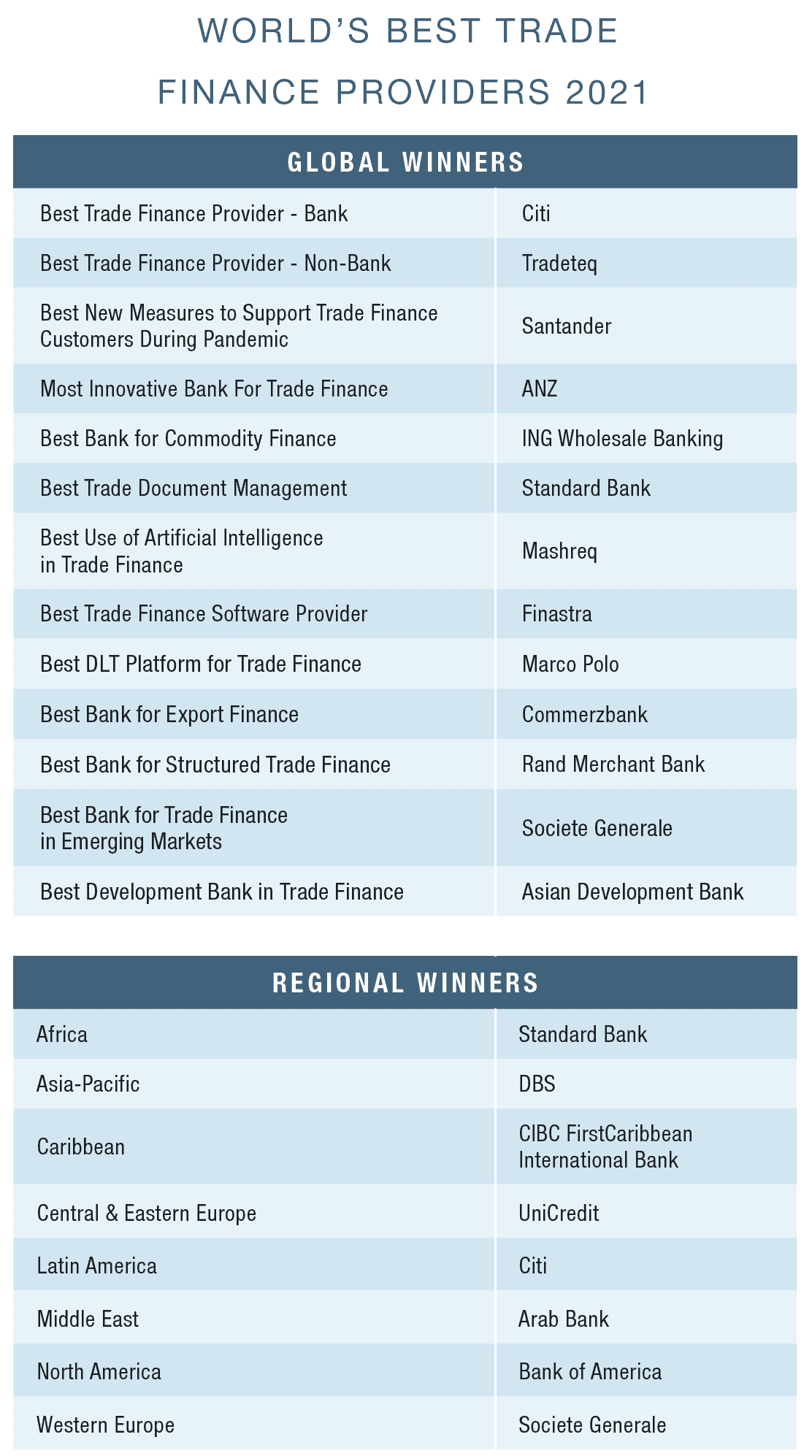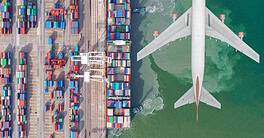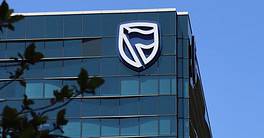For many trade finance banks that still relied on legacy systems and paper-based processes, the Covid crisis put them on a forced march into the future.

Trade finance bore the full force of the institutional crises inflicted by the coronavirus pandemic. Corporate entities and banks struggled with liquidity issues, supply chain disruptions and payment delays. Legacy platforms and archaic paper-based processes still in place at most trade finance providers created additional obstacles.
Goods nevertheless continued to move across borders, however, thanks in large part to fast action by authorities. In any crisis, there’s an immediate demand for liquidity; and at the start of the pandemic, governments and central banks stepped in with liquidity for the markets.
As one issue dissipated, however, another started. Some companies had to expand their supply chains and find new sources. Among their biggest challenges were understanding tax implications and export-import regulations—and establishing their reputations in new arenas.
“Trade is essentially all about trust, and many of the banking propositions are around those instances where the trust isn’t there,” says Ebru Pakcan, global head of trade on the Treasury and Trade Solutions team at Citi. “How does the bank, as the intermediary, help a company build that trust?”
Technology, in some cases, furnished solutions. Banks and other providers embraced digitization strategies and introduced efficiencies into their processes that ultimately lowered costs, helped corporates manage their balance sheets and attracted new investors. Since trade finance is highly regulated and paper-based, processes can be repetitive and manually intensive. When staff are working remotely and socially distancing, obtaining wet signatures is inefficient and transaction flow slows down.
Providers’ readiness and ability to switch to more automated processes varied widely; but some made significant investments in technology and implemented cutting-edge solutions like blockchain, artificial intelligence, machine learning and robotics. What saved the day for many, however, were simple technology solutions that have been around for decades, such as electronic signatures and application programming interfaces that improve connectivity between banks and their client companies.
“What is different now is the fact that necessity is intensified,” says Pakcan. “Necessity is the biggest innovator.”
The range of solutions, improvisations and transformations that the best trade finance banks adopted last year are reflected in the selections made by the editors of Global Finance, with input from industry analysts, corporate executives and technology experts, across 102 countries and eight regions.
New global awards were added this year in two categories: Best New Measures to Support Trade Finance Customers During Pandemic and Best Development Bank in Trade Finance.
The regional and global winners of the 21st annual Global Finance World’s Best Trade Finance Providers are the banks we judge to be the leaders in developing and taking advantage of new capabilities while also monitoring global trends to deliver key insights on both trade and finance to their clients.
Methodology
Global Finance editors select the winners for both the Trade Finance Awards and the Supply Chain Finance Awards with input from industry analysts, corporate executives and technology experts. The editors also consider entries submitted by financial services providers, as well as independent research, taking into account a set of objective and subjective factors. This year’s ratings, which cover 102 countries and eight regions, were based on performance during the period from the fourth quarter of 2019 through the third quarter of 2020.
It is not necessary to enter in order to win, but experience shows that the additional information supplied in an entry can increase the chance of success. In many cases, entrants are able to present details and insights that may not be readily available to the editors of Global Finance.
The winners are those banks and providers that best serve the specialized needs of corporations as they engage in cross-border trade. The winners are not always the biggest institutions, but rather the best: those with qualities that companies should consider most carefully when choosing a provider.
Global Finance uses a proprietary algorithm with criteria—such as knowledge of local conditions and customer needs, financial strength and safety, strategic relationships and governance, competitive pricing, capital investment and innovation in products and services—weighted for relative importance. Each entity is rated on each separate criterion. The algorithm incorporates those ratings into a single numeric score, with 100 equivalents to perfection. In cases where more than one institution earns the same score, we favor local providers over global institutions and privately-owned over government-owned institutions.
|
GLOBAL WINNERS |
|---|
BEST TRADE FINANCE PROVIDER—BANK
Citi
As a connected global bank with trade operations in over 90 markets, Citi leverages its local teams and their local market knowledge to help clients that are quickly expanding into new markets and moving more goods between global regions.
At present, Citi transacts in over 130 currencies, enabling companies to standardize their worldwide operations. The bank is also a pioneer of distribution and syndication of trade assets, helping clients to efficiently scale these programs through its expertise, infrastructure and relationships.
Citi focuses on digitization. Its toolkit includes application programming interfaces (APIs) and host-to-host applications that provide greater connectivity and solutions, such as electronic signatures that allow clients to conduct business as usual while following health guidelines during the coronavirus pandemic. A founding bank of the standard-setting Trade Information Network, Citi also invested in the blockchain consortia Contour and Komgo.
BEST TRADE FINANCE PROVIDER—NON-BANK
Tradeteq
Stringent regulatory standards require banks to hold more capital on their balance sheets, restricting cross-border trade for corporations and creating a $1.4 trillion to $1.6 trillion funding gap that equates to 8%-10% of global trade, the Asian Development Bank estimated in 2019. London-based Tradeteq’s financial technology uses artificial intelligence (AI) to reduce the trade finance gap by improving access for small and medsize enterprises (SMEs) and corporations.
Trade finance is a short-term, low-default, low-yield asset. But by providing an end-to-end solution with portfolio management, risk analytics and investment automation, Tradeteq makes investing in this asset class a more standardized and efficient process. Its platform transforms trade assets from invoice format into capital markets instruments, preserving the few basis points of yield for investors, and automates the distribution process.
Tradeteq’s portfolio-management and trading functions give investors access to thousands of instruments and the ability to monitor and report trades. To help investors maintain compliance with regulations, Tradeteq uses AI for credit scoring that more accurately represents a company’s risk profile, using real-time metrics.
BEST NEW MEASURES TO SUPPORT TRADE FINANCE CUSTOMERS DURING PANDEMIC
Santander
As the Covid-19 virus traveled the world last year, Santander prioritized the health of employees, customers and investors. The bank also worked to lessen the economic impact, putting in place contingency plans that addressed the issues specific to each of the countries in which it operates. That included helping them to rapidly implement government measures providing liquidity to their customers, such as credit lines with public guarantees, and financial support to SMEs and corporates, amounting to an average €1 billion ($1.2 billion) every day during April and May.
To support customers, Santander developed digitization projects that enabled customers to safely continue operations. These included new digital channels to issue, modify, cancel and execute guarantees. The bank’s size and reach add to the impact of projects such as these; as of the end of the thirdquarter of last year, Santander had provided export and credit agency (ECA) finance and was the leading bank for ECA financing volume by mandated lead arranger for fiscal year 2019, according to Dealogic and TXF.
MOST INNOVATIVE BANK FOR TRADE FINANCE
ANZ
With more than 7,000 clients globally and teams on the ground in 29 countries, ANZ focuses on giving exporters–ranging from small, first-time participants to the largest multinationals–access to trade and working capital solutions as well as the full range of trade products. Its strategic priorities include automation and digitization through machine learning (ML), smart optical character recognition, AI, image recognition and natural language processing. These technologies have had real impacts for ANZ as a whole, reducing the bank’s manual processing by up to 50% and improving turnaround time by up to 40%. Applying ML and robotic process automation to transaction processing saves hours of manual work, while customers benefit from lower costs.
ANZ also provides integration and straight-through processing capabilities to boost client connectivity, while its trade finance help desk provides a central contact point for customers. The bank invests heavily in distributed-ledger technology (DLT) platforms and was a designer and founding member of Lygon, a blockchain-based bank guarantee process solution, and the Trade Information Network.
BEST BANK FOR COMMODITY FINANCE
ING Wholesale Banking
ING Wholesale Banking (ING WB) put a shine on the commodities market with its continuing moves to automate. Commodities banking has been under severe pressure and some banks have given up on this sector. Yet ING is holding strong, bringing in a new global head of trade and commodity finance, Maarten Koning, to lead a “back to basics” strategy of collateral-based trade financing, enhanced with more audits, more warehouse checks and better collateral management deals, and other measures. according to S&P. ING has improved efficiency with MineHub offer, a blockchain-powered platform that streamlines document flow, financing and logistics, and provides real-time capability to purchase, sell and deliver metals from the ground to the market, and participates in other blockchain-based trade finance initiatives, such as Easy Trading Connect, Komgo, Marco Polo and Contour.
BEST TRADE DOCUMENT MANAGEMENT
Standard Bank
Standard Bank has automated approximately 80% of its issuance procedures for guarantees and lines of credit and dramatically reduced response time, as part of its Digital Strategy for Trade initative. The South African bank now offers an API that links the client’s enterprise resource planning platforms with its internal systems, removing the need for rekeying data. Execution time for Standard Bank’s issuance process fell from 30 minutes to a minute as a result. A partnership with fintech vendor Traydstream has produced other time savers: automated, streamlined document-checking, sanction-screening and vessel-tracking processes that use optical character recognition and ML, often providing results within minutes.
BEST USE OF ARTIFICIAL INTELLIGENCE IN TRADE FINANCE
Mashreq
Mashreq, headquartered in the United Arab Emirates, has turned to AI to identify new business opportunities in trade exports. Its TradeFursaa offering, which the bank’s trade team developed, draws data from Mashreq’s multiple business groups and applies predefined rules to spot likely candidates. Once pinpointed, the platform’s autonotification engine messages the relevant teams and tracks conversions and lost opportunities. Mashreq has also implemented ML and optical character recognition to extract and validate data from a range of unstructured forms, increasing productivity 60% and reducing turnaround time from two days to three hours during the first phase of deployment.
BEST TRADE FINANCE SOFTWARE PROVIDER
Finastra
A banking platform provider, Finastra scored its second win in two years as Best Trade Finance Software Provider. The vendor offers platforms that support front-to-back capabilities for working capital finance. Clients have the option of using Finastra’s integrated front-end Fusion Corporate Channel or connecting to existing channels through the vendor’s open API. Finastra’s FusionFabric.cloud also provides easy integration with digitized documentation, automated data capture and screening platforms from a growing ecosystem of partners.
BEST DLT PLATFORM FOR TRADE FINANCE
Marco Polo
Technology solutions are transforming trade finance, with blockchain and DLT platforms contributing to the creation of a more connected digital global trade ecosystem. Marco Polo, a technology platform launched by TradeIX and a consortium of banks, has played a role introducing new, digital versions of existing payment obligations and undertakings that provide an efficient alternative to traditional documentary trade finance solutions like LoCs.
The Marco Polo Network allows parties to transact digitally and leverages blockchain to prevent disputes arising from contract ambiguities. Users benefit from platform efficiencies like automation that matches purchase orders and invoices through business rules. The platform also helps users save time and money by replacing paper-heavy processes with digitized workflows.
BEST BANK FOR EXPORT FINANCE
Commerzbank
Commerzbank finances €50 billion worth of trades across 150 markets, in as many as 50 currencies annually. The 150-year-old bank has improved its agility by implementing new technologies that help it process more than €30 billion in LoCs annually. Last May, it successfully demonstrated an international trade finance transaction with Turkish bank Isbank via the Marco Polo Network, which incorporates DLT. The pilot transaction followed others that Commerzbank conducted over the network, including via Marco Polo Payment Commitment.
BEST BANK FOR STRUCTURED TRADE FINANCE
Rand Merchant Bank
Despite a pandemic and severe economic downturn, Rand Merchant Bank (RMB) grew its trade revenue by 17% in the fiscal year ended June 30, 2020. Much of this growth was driven by applying innovative technology and adopting a “banks as clients” strategy, by which RMB offered aspirational-size trade loan deals to its client banks. This approach sparked a threefold increase in the bank’s gross trade loan portfolio while growing its syndication and distribution capabilities by more than 20%. Especially since the Covid-19 crisis began, RMB has also used traditional and innovative structures, such as LoC confirmations, trade loans and structured line of credit refinancing, to inject funding and provide support to its client banks across Africa.
BEST BANK FOR TRADE FINANCE IN EMERGING MARKETS
Société Générale
Société Générale brings more than a century and a half of experience to the clients of its Global Transaction and Payment Services in more than 50 countries on six continents. The bank maintains a presence in 19 African nations and provides client support in 12 additional sub-Saharan countries through a cooperation agreement with South Africa–based Absa. SocGen’s “Africa Express” initiative aims to help its portfolio of 465 Chinese corporate clients pursue their projects in Africa via eight dedicated local trade desks overseen by its head of the China-Africa business in Paris.
BEST DEVELOPMENT BANK IN TRADE FINANCE
Asian Development Bank
As the Covid-19 global pandemic spread throughout Asia, the Asian Development Bank (ADB) increased its capacity and flexibility to support its Trade and Supply Chain Finance Program. The multilateral development bank streamlined approval, extended tenors and expanded product offerings, while its board agreed to increase the program’s range and scope. As a result, it participated in approximately 4,000 transactions valued at $3.2 billion during the first eight months of the pandemic, including 828 food-security and 220 medical-supply deals. ADB continues to digitize trade finance through its participation in Contour’s DLT-based trade finance network.
|
REGIONAL WINNERS |
|---|
NORTH AMERICA
Bank of America
During the year of the pandemic, corporates have faced greater challenges than ever managing their treasury operations, including increased pressure to improve their performance in areas like data, payments, costs, fraud and risk. Bank of America’s Global Transaction Services team has focused on optimizing clients’ treasury operations and working capital with the introduction of its Intelligent Treasury Roadmap, which lays out initiatives for conducting business in real time. These initiatives are intended to help clients gain efficiencies by simplifying their operations, using advisory expertise to deliver actionable items, and helping clients mitigate risk as well as detect and manage fraud.
Bank of America is also focusing on trade digitization and innovation, both in-house and in partnership with fintechs. Aiming to provide a seamless client experience, Bank of America joined the Marco Polo Network in 2019 and has continued to build its CashPro Trade front-end platform, which provides a range of transactions across treasury and trade along with detail on cash positions.
LATIN AMERICA
Citi
Operating in 23 Latin American countries, Citi has established working relationships with governments and regulators and developed an extensive knowledge base in each country. Its digital platform, CitiDirect BE, is an integral part of its trade solutions and services in the region, providing real-time reporting and reconciliation as well as digitized trade flows that eliminate inefficiencies within operations.
Citi has also implemented digital bank guarantees and developed a value-added “Distribution Finance” solution to help Brazilian clients free up their balance sheets.
Citi’s Latin American clients get digital access to data, insights and transactions through global channels–an increasingly important resource at a time when clients must exercise contingency plans and move staff to work from home. As part of its transformation into a digital bank, Citi has also launched regional and local webinars that inform and update clients in more than 72 countries on its latest digital services and how to use them.
CARIBBEAN
CIBC FirstCaribbean International Bank
With more than 2,700 staff, 57 branches, and seven offices on 16 Caribbean islands, CIBC FirstCaribbean is the largest regionally listed bank in the region, holding more than $1.1 billion in equity and $11.9 billion in total assets as of April 2020. The bank provides financing solutions and trade finance as a member of the CIBC group of companies. The Caribbean economies have been dramatically affected by the decline in tourism following travel restrictions and border closings during the pandemic; CIBC FirstCaribbean has responded by providing banking access with a zero-rating initiative across the bank’s top sites and mobile banking app that allows free access to its online platforms while also continuing its digitization efforts.
WESTERN EUROPE
Société Générale
With 130,000 staff in 62 countries serving 29 million clients and a 39-country trade network, Société Générale is expanding its trade finance services to include green trade guarantees and sustainability-linked trade projects. SocGen has trade limits on 700 banks worldwide and also offers advanced foreign exchange solutions in more than 120 outgoing and 40 incoming currencies.
The bank also participates in several consortia and pilot groups that develop transaction banking standards for the industry, and is a founding member of Komgo and other blockchain and DLT-based platforms. Along with six other major European banks, SocGen co-founded we.trade in 2017. The first transactions took place in 2019, making SocGen the first bank in France to issue blockchain-based trade transactions.
CENTRAL & EASTERN EUROPE
UniCredit
UniCredit returns as Best Trade Finance Provider in Central and Eastern Europe. The Pan-European commercial bank’s Global Transaction Banking business offers cash management and e-banking services, transactional sales and trade services, global securities services and custom long-term structured trade and export finance in 13 CEE markets via a network of 4,000 correspondent banking relationships in 175 countries. UniCredit fosters innovation through internal research and development and externally through its HVB Agile Execution Lab’s partnerships with up-and-coming fintech vendors.
Asia Pacific
DBS
DBS is a leader in Asia Pacific trade finance, driving revenue and asset growth by developing new client relationships in growth industries, forging key industry partnerships and commercializing its market-leading digital solutions.
DBS, which took Global Finance’s award as World’s Best Bank in 2020, has improved connectivity with customers by leveraging APIs that deliver trade instructions and applications to the bank with little manual intervention. These efforts have strengthened its relationships with multinationals and large domestic corporates.
DBS has digitized processes in core Asian markets, including supplier onboarding and document submission. Its Accounts Receivable Purchase solutions help clients to monetize receivables, optimize balance sheets and manage the credit risk of buyers. Its use of technological tools like APIs allow for more-secure connectivity in real time with clients’ internal trade finance systems, helping customers to realize operational efficiencies and save time as end-to-end real-time transactions eliminate the need for batch processing.
MIDDLE EAST
Arab Bank
With a network of more than 600 branches across the Middle East, North Africa and in global trade hubs, Arab Bank leverages its geographic presence and local expertise to deliver an array of trade finance offerings to domestic clients and multinationals. In so doing, the bank takes an omnichannel approach that permits clients to manage their activities seamlessly across web browsers and mobile applications as well as offline within branches in real time. Arab Bank’s ArabiConnect cash management and trade finance platform and ArabiSync corporate-to-bank connectivity service offer corporate clients a soup-to-nuts digital and self-service transaction-banking environment, while its specialized Corporate Business Center provides remote technical support and query services for online corporate clients.
Africa
Standard Bank
With a history dating to the mid-19th century, Standard Bank has a presence in 28 countries, 20 of which are in sub-Saharan Africa and represent approximately 80% of the region’s GDP. Its Transactional Products and Services teams, which are a part of its Corporate and Investment Banking business, provide a comprehensive suite of cash management and international trade finance offerings. In September, Standard Bank launched its Africa China Agent Proposition, which connects African importers with Chinese exporters and facilitates trade financing, payments and collections to support Africa-China trade flow in South Africa. in 2018, the bank obtained a banking license to operate in Côte d’Ivoire, opening trade finance opportunities within the West African Economic and Monetary Union.





